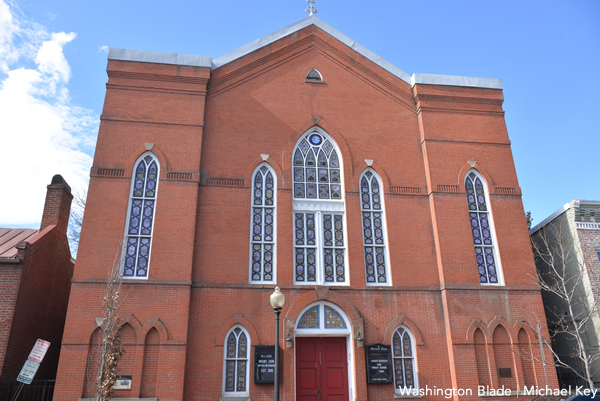Opinions
D.C. shouldn’t lower local and federal voting age to 16
City would be only place allowing minors to vote in presidential, federal elections

D.C. Council member Charles Allen (D-Ward 6) (Photo by Lorie Shaull via Wikimedia Commons)
Okay, start rolling your eyes now: Older columnist doesn’t think letting high-school kids vote is a good idea.
This week, D.C. Council member Charles Allen introduced a bill during Tuesday’s legislative meeting that would lower the voting age to 16 in the District for all elections – including presidential, congressional, federal and local contests. Allen’s measure was co-sponsored by a total of six others when former Mayor and now Council member Vincent Gray signed on immediately prior to the bill’s introduction.
These seven preliminary supporters comprise a bare majority of the Council if all of them eventually do vote for passage.
If the measure is ultimately approved by the Council and additionally signed by the mayor, D.C. would become the only jurisdiction in the country to allow minors to vote in presidential contests and federal-level elections, and the only major city to allow minors to vote in local races.
The 1971 ratification of the 26th Amendment, which lowered the national voting age from 21 to 18, does not prohibit states or localities from establishing lower voting-age eligibility. Despite the available opportunity, no state has ever done so in the ensuing five decades and no jurisdiction has ever done so for presidential or federal elections. Only a tiny handful of small-sized municipalities have lowered the voting age for even local positions.
Allen cited the recent youth-centric anti-gun rally in Washington as a rationale for his bill. He additionally referenced 16-and-17-year-old minors in a media release issued the day he introduced his proposal by stating, “They can drive a car. They can work. They pay taxes.”
Allen also added that, “Just a few weeks ago, young District residents organized a citywide school walkout and spoke passionately at the Rally for DC Lives calling for an end to gun violence.”
Viewers watching the session may have been tempted to chuckle at all this nonsense, but Allen managed to maintain a serious demeanor throughout.
It’s an attempt at equivalency with “they can be drafted to fight in a war” and “they are old enough to purchase and consume alcohol” that were rallying cries among the now-Boomer-generation during the era of anti-Vietnam-War protests and when 18 was the national legal drinking age – which it’s worthy noting has since been raised to 21.
But Allen’s suggestive comparative measurement to then-and-now sort of begs a pondering: Why not also sanction high-school-age 14 and 15 year-olds to vote? Underage minors showing up at political rallies around the country, or paying taxes at youthful first-jobs, are hardly sufficient reasons to lower the voting age to include pubescent kids. Does the Council intend to establish a driver’s license as the new voter card?
There’s a general and accepted proposition that the advent of adulthood, with the attendant responsibilities and obligations prompting a corresponding level of personal independence and relative maturity, is an appropriate milestone at which to convey the right and privilege of voting.
Despite the tendency of District politicians to transparently covet the chance to make national headlines with whatever exotic, edgy and trendy proposal they can concoct in advance of any other jurisdiction adopting the same and ahead of them, this is nothing more than one that crosses an invisible-but-everyone-can-see-it line of common sense.
A similar bill introduced by Allen in 2015 went nowhere, failing to engender either a committee hearing or vote by the Council. Now, however, Allen chairs the Judiciary Committee and controls consideration of the measure, giving him the power to potentially advance the proposal through the legislative process and before the full Council for a vote.
Current city law allows 16-year-olds to pre-register to vote and permits 17-year-olds to vote in their registration-affiliated party’s primary election, under the city’s increasingly antiquated “closed-primary” system, if they will turn 18 by the date of the general election.
Sorry, kids, but that’s where the voting age should remain.
Opinions
University students have a right to protest
But they must not threaten Jewish students on campus

I support the right of students at Columbia University, and other colleges, to protest. They must understand they are protesting on private space. What I also find interesting is how many of them see their right to protest, and right to free speech.
The First Amendment gives us a right to free speech, but it doesn’t specify what exactly is meant by freedom of speech. Defining what types of speech should and shouldn’t be protected by law, has been left to the courts. Clearly free speech has its limits. Obscene material such as child pornography, plagiarism of copyrighted material, defamation, or threats, aren’t allowed. Also not protected under the First Amendment is speech inciting illegal actions, or soliciting others to commit crimes. Private employers, and universities, are allowed to set their own guidelines as to what speech is allowed for their employees, and on their campuses.
The debate over student protests at Columbia University is not a new one. I remember when the Student Afro Society (SAS) and the basically all-white Students for a Democratic Society (SDS), demonstrated and took over buildings at Columbia in 1968. Some were protesting the Vietnam War, others what they deemed would be a segregated gym in Morningside Heights, and Columbia’s infringement on a minority community. Both legitimate causes. Those demonstrations took a nasty turn when students took over buildings and cut off water and electricity to them. They held a sit-in, in the president’s office, and took a dean hostage. Police were called and in some cases it got violent. We are not at the 1968 stage yet in the current demonstrations, and if outside agitators don’t get involved, it may not get to that.
I agree with some of what the demonstrators are calling for, including having Israel rethink how it is conducting this war, protection for the Palestinian people, and immediately providing them with food and medicine. I don’t agree with their call to support BDS, which is the disinvestment in Israel. BDS is a Palestinian non-violent movement begun in 2005. I also see hypocrisy in what some of the protesters are saying. While they claim Israel is committing genocide in Gaza, which many disagree with, the same people are calling for genocide against Israel by supporting Hamas. It is Hamas’s stated goal to wipe Israel off the face of the earth, “from the river to the sea.”
Calling out Israel for its tactics, is not anti-Semitic. But attacking, and calling out Jewish students on campus, telling them to go back to Poland, which we have seen on video, and making them feel unsafe, is. Then there is the totally outrageous statement, “Zionists don’t deserve to live.” made by Khymani James, one of the student leaders of the Columbia, pro-Palestinian student protest encampment. He made the comments during and after a disciplinary hearing with Columbia administrators that he recorded and then posted on Instagram. I hope the president of Columbia University will be able to negotiate an agreement with the peaceful student demonstrators, including amnesty for some of those students who were arrested, if the students agree to certain parameters for continuing demonstrations. One being they cannot make other students feel unsafe on campus.
I find it abhorrent that House Speaker Mike Johnson has inserted himself at Columbia University, calling for President Shafik to quit. It is a totally inappropriate political stunt. The same goes for Rep. Elise Stefanik (R-N.Y.) who called for the Biden administration to revoke the student visas of all foreign students who are demonstrating. Those students came to the United States for an education, because we are a free country. If they agree to the guidelines of the university, and what is recognized as acceptable free speech, we should continue to welcome them, and allow them to voice their feelings. Again, as long as they don’t threaten others while they do so.
I am Jewish, and a strong supporter of the State of Israel. That support has not stopped me from calling on the Israeli people to rid themselves of Netanyahu, and his right-wing government. I oppose the settlements, and support a real two-state solution. But for that to happen not only will the Netanyahu government have to go, but the Palestinian people will have to reject Hamas. I have not heard the call for Hamas to release the hostages they took, whether those hostages are alive or dead at this time.
I strongly believe in the right to protest, and for Americans, and those here legally, to speak out. In 1969, I came to D.C. to protest the Vietnam War in front of the Justice Department and was tear-gassed. I had a right to protest in a public space. Since that time, I have participated in many demonstrations. Some around the White House supporting rights for the disabled community, LGBTQ rights, women’s rights, and in the ‘80s, demanding the government recognize, and do something about HIV/AIDS. The difference was in these demonstrations, those who disagreed were not threatened. The demonstrations I participated in, took place in public space, not the quad at Columbia University, or other university campuses, which is private space. Students who protest there must understand that.
My hope is none of the peaceful student demonstrators at Columbia, and other institutions, those who do not threaten fellow students, are thrown out, losing the chance to earn a degree. Those students chose to go to their schools because they thought they would get a good education, and believed graduating from those schools would be good for their futures.
Peter Rosenstein is a longtime LGBTQ rights and Democratic Party activist. He writes regularly for the Blade.
Opinions
Successful open relationships take effort
We have options as couples but they all require work

(Editor’s note: This is the second of a two-part feature on open relationships. Click here for last week’s installment.)
Open relationships are often ridiculed as the easy way out of commitment. After speaking with Scott and Kelsey, however, it’s clear they’re anything but easy.
Kelsey reflected on the ups and downs of being open in the past. “Younger me definitely needed it,” Kelsey said. “At the same time, drama came with it as well.”
While Scott and their partner have been together for nine years, it took four before they decided to open their relationship. “It came from the desire for the two of us to meet boys together,” said Scott. “Then we had some really terrible threesomes.”
Drama. Bad threesomes. Yikes – these aren’t exactly selling points for being open. But their experiences underscore something important: open relationships, like all relationships, are actually quite hard. Couples considering openness shouldn’t trick themselves into thinking it will make things easier. In reality, they take a lot of work.
For Scott, those really terrible threesomes led them to opening up further, but with established boundaries. “We came up with ground rules. Use protection. No spending the night at somebody’s house, etc.”
Since Scott and their partner are happy in their relationship, these rules seem to work even if they’ve shifted over time. “Being in an open relationship comes down to being really good at communicating with your partner,” they added. “It’s about communicating and checking in to see where your partner is.”
Open relationships should be for the right reasons
As open relationships began taking off, observers were skeptical for good reason. “In the past, people were just cheating,” said Kelsey. Another comment from Scott echoed this. “I’ve seen open relationships and it felt like one partner was being taken advantage of by the other.”
It turns out there is a fine line between sexual exploration and free passes. While some open relationships walk that line well, others – not so much.
In all fairness, now more than ever it’s difficult to remain monogamous, and one culprit is the rise of accessible hookup culture via social media. Apps like Tinder, Grindr, and dare I say Instagram are facilitating secret sexual connections never seen before. They ushered in a new era of cheating into relationships, alongside a bit of excessive stalking as well.
So, to avoid an atmosphere of mistrust and pain, a natural evolution for couples is to change the rules altogether. Cheating can’t be cheating if it’s allowed, right?
However, once it is allowed, I wondered why these people don’t cut the strings altogether and be single. In response, Chad made an interesting point: people aren’t just afraid of being cheated on – they’re afraid of the appearance of being single as well. We live in flashy times where our online image means everything. The dream is not necessarily having a partner, but showing the world you have a partner. Without that, you otherwise appear lonely.
So, do open relationships ease the pain of cheating and perceived loneliness? As a proud lone wolf I’m not the best person to assess, but based on my observations I can say this: being open works for some couples, but by no means is it a fast pass to being happy. Understanding why you want one is just as important as discovering how to make one work.
With all this said, the undeniable risk – and perhaps downside – of a monogamous coupling is the higher chance of cheating outright. Unfortunately, that’s something Chad knows all too well.
Preferring monogamy is still OK
Chad had dated someone for two years before they married for five. Then, just over a year into the pandemic, his husband informed him he was dating someone else. They separated a few days later.
For Chad this was painful, as it is for anyone, gay or straight, who’s gone through something similar. But when I asked him if this experience shaped his outlook on what he’s looking for, his response came as a bit of a surprise:
“It has not changed my view for or against open relationships,” he said. “I learned a lot in my marriage. It takes a lot of love, trust, and communication, which at times can feel like work. It also takes two; one can’t carry the relationship. I want to date someone who wants to be in a relationship with me.”
My heart swells hearing that, for even after experiencing the deepest kind of hurt, Chad searches for his one and only. Why? Because for him, the love he’s looking for is worth the wait. It’s a beautiful sentiment that makes so-called hopeless romanticism the raddest feeling in the world sometimes.
More importantly, Chad doesn’t let fear alter his view on love, and to me that’s the most important lesson of this article. Love always comes with risks, and lowering your standards to reduce them never really pans out, does it? The best we can do is to be ourselves.
By the way, this is a lesson I should also apply. My main hesitation toward an open relationship is that I’m a jealous bitch, and I fear that jealousy will never go away. Yet this can be hard to admit when everyone around you is propping up a culture where open is supreme and jealousy is immature.
When I brought this up to Kelsey, she pushed back with a simple question: “Do you think jealousy is a bad thing?”
This caught me off guard. “I’m not sure,” I replied. “Do you?”
“Jealousy is a natural, human emotion,” she said. “It’s what you do with it that matters.”
So, maybe my goal is not to suppress my jealousy but rather be upfront about it. If it’s part of me, I should own it, then ideally find someone who loves me regardless.
Changing your mind is OK, too
In gay man speak, I was a top for my first seven years before I embraced bottoming. For some, they’d be shocked to hear it. Yet maybe no one should be surprised, for as we all know sexuality is fluid, and this applies to more than just your orientation. Your sexual preferences can shift over time, too, and this will inevitably affect your relationships.
This was the case for Scott and their partner. “When we first started dating, we did not want to be open,” they mentioned, “but as our relationship grew, we decided to reevaluate that.” Meanwhile, Kelsey went the opposite direction – she was open back in the day but chooses to be closed now.
Even Chad remains open to being open. “I’m not opposed to an open relationship, but I feel like it would take more work. I just don’t see myself starting a relationship open. The first few years there is a lot of learning about each other.”
In a world of shifting preferences, the best we can do is reflect on what we want and be honest about it. Life is a process of discovering who we are, and damn is it messy. So, perhaps I should cut some slack to the couple trying things out. And perhaps they can cut me slack for not understanding their rules.
For the couples: remember, a solid relationship is not only about meeting the needs of your partner, because your needs matter, too. The best relationships, open or closed, strive to find that balance.
For those still searching: remember that love is more than just that thing, that connection, that spark. In fact, love is so complex that the “spark” is just one of many factors, alongside timing and how you want to be loved, that come together and form an imprint as unique and special as the person you want to be with.
In this sense, open and closed relationships aren’t diametrically opposed but rather complimentary, a sort of yin and yang where both become better because the other option exists. Today, we have options as couples, and that’s significantly better than abiding by rules because we assume that’s how it must be.
And that feels right. Because regardless of whether you’re more a Chad or a Scott, the truth is: I feel lucky to have both.
(Writer’s note: A big thank you you to Chad, Scott, and Kelsey for allowing me to share their stories.)
Jake Stewart is a D.C.-based writer and barback.
Opinions
Fact: The next president will be Biden or Trump
One candidate is clearly better for the future of the world

Like it or not, the next president will be either Joe Biden or Donald Trump. In our system, third-party candidates are simply spoilers, they don’t win. The last time a third-party candidate won was 1856. It has been 36 years since a third-party candidate even got more than 5% of the vote. So, it’s time to face reality and choose; for your future, do you want Biden or Trump?
I was prompted to write this column because I see the media interviewing young people about who they want as their president. I have great respect for the young people of today. In many ways, they are smarter than my generation was. But it’s clear, some don’t fully understand the presidential election process. I hear many complain about Biden, and then follow that up and say they will never vote for Trump. Some then say they will vote for a third-party candidate. They need to understand their third-party candidate will not win, but their vote could help elect Trump. I hate to say it, but in 2024, voting for a third-party candidate is the equivalent to flushing your ballot down the toilet.
I am an unabashed Biden supporter. I see the great things he has done, including: getting us through the fallout from the pandemic, passing an infrastructure bill, forgiving billions in student loans, ensuring our economy is the best in the world with more than 13 million jobs created, and increasing wages. He supports unions, being the first president to walk a picket line with the UAW. His administration is working to deal with climate change. He is fighting for a woman’s right to control her own body and healthcare, and supports full equality for the LGBTQ community. In this dangerous world he has kept our troops out of war.
Then there is Trump. To be clear; I see him as a racist, sexist, misogynistic, homophobic, pig. OK, so maybe I don’t have strong feelings about him. Trump has been found liable for sexual assault and has been indicted on 91 counts. He proudly claims credit for having taken away control of their body and healthcare from women, when the justices he appointed ended Roe v. Wade. He supports states making decisions on abortion, and we see what recently happened in Arizona. He is a climate change denier and is opposed to wind and solar power. He wants to give more tax deductions to the rich and to corporations, while opposing any increase in the minimum wage. He opposes equality for the LGBTQ community, refusing to endorse the Equality Act. He opposes student debt relief.
You may see these candidates differently, and that is OK. But if you like one more than the other, fear one more than the other, or just aren’t enamored by either, you must still make a choice and vote for one of them. Staying home is abrogating your civic responsibility, and especially if you would never vote for Trump, understand your staying home helps him.
Young voters, like all voters, should take the time to do the research on both candidates. Then match what you find as close as possible to what you want to see as your future. If you want student loan relief, equality for the LGBTQ community, women having control of their body and healthcare, equal pay for women, efforts to ameliorate the impact of climate change, then clearly Trump is not your candidate.
I hear some young people say they won’t vote for Biden because of his positions on the Israel/Hamas war. I, too, have called for Israel to recalibrate how they fight this war. But I ask you to look again at Trump’s history of attachment to Netanyahu, even going so far as relocating the U.S. embassy to Jerusalem. If you want a chance for the Palestinian people to live in peace and prosperity, for Israel to remove their settlements from the West Bank, your chance of having that happen is clearly better with Biden than Trump. Don’t let your emotions today, cloud the reality of the future.
Yes, Biden is old, but so is Trump. He apparently can’t even stay awake at his own trial having nodded off two days in a row. So, since one of them will be president, with no third-party candidate having a chance, I urge you to look at them again, in a realistic way. Then make your choice. I think you may come to the same conclusion I have. Though not perfect, and no one is, Biden is the better candidate for your future, and for the future of the world.
Peter Rosenstein is a longtime LGBTQ rights and Democratic Party activist. He writes regularly for the Blade.



















